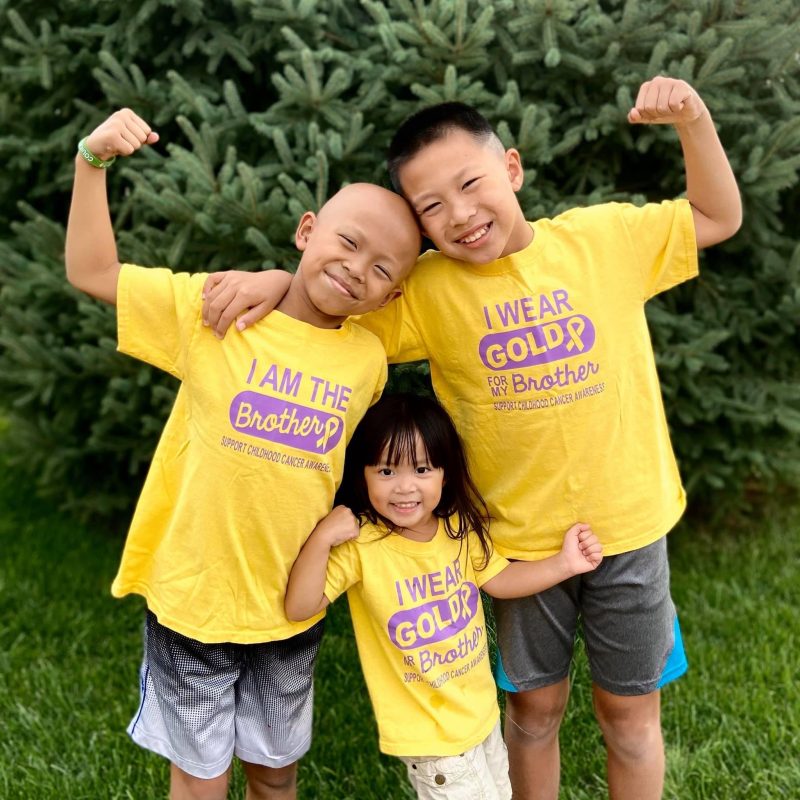When a child is diagnosed with cancer, the entire family is impacted and dynamics change. Those changes can be especially difficult for siblings. Understanding the emotional responses of your other children will make it easier for you to recognize when they are having difficulty. You can help by talking to your child about their feelings, explain what is happening with their sibling, create opportunities for them to express their concerns, and establish a routine for them to adjust to their “new normal.”
A child’s age and coping skills affect how they may react to the diagnosis. Fear and anxiety are common responses of children, they may worry about what is happening to their brother or sister. They may even worry that something they did caused them to get cancer.
Anger, jealousy, and resentment are also feelings siblings commonly have. Siblings can become angry with their parents for having less time for them. Jealousy occurs when the child with cancer starts receiving extra attention and gifts. They may even resent that their sibling doesn’t have to do chores or go to school.
Siblings may feel left out and alone, especially when parents are at the hospital and doctors’ appointments frequently. They may feel that they’ve lost the friendship of their sibling when they are inpatient a lot. Siblings may also miss time with their friends, if parents can’t take them to regular social outings due to the demands of a child’s cancer treatment. They may feel sad that everything seems to have changed and grieve the loss of a “normal” family life.
Children often don’t know how to express their feelings, so they may start misbehaving or acting out in negative, attention-seeking ways at home or school. This could be not wanting to leave their parents or go to school, withdrawing from the family, or even regressing. Siblings may become irritable, start fighting with parents or siblings, or perform worse in school.
Caleb is a 9 year old boy who has been battling neuroblastoma for almost 5 years. He has an older brother and younger sister and while their parents love all of the children equally, they acknowledge that most conversations revolve around Caleb’s treatment, travel and medications. “It is not easy to be fair and treat all of your children the same when you have a child with cancer”, say’s his father Martin.

Martin believes Caleb’s older brother Matthew has experienced anger, jealousy, and resentment throughout Caleb’s cancer battle. He has missed out on basketball and fun experiences when they travel out of state for Caleb’s treatment. They’ve been more lenient with Caleb’s household chores and discipline since he has been sick.
In order to help Matthew process his feelings, Martin said they “talk through all problems and struggles along the way and have always faced his cancer battle as a family. His brother sees how hard Caleb is fighting for his life and the pain he goes through so he naturally wants to support him. Matthew understands that he’s blessed to not have the pain and sickness Caleb endures. His little sister Maura is also understanding, there to calm him and is by his side through it all”.
Martin’s wants other parent’s to know that “it’s not always easy, but communication is key. Listen to the sibling and talk through all of the feelings they are having. Comfort them, pray with them and cry with them. Parents don’t always have to say the perfect thing or have the perfect moment with their children. You can’t always be fair to the siblings but explain why and just be there for them”.
Parents who have a child with cancer are already overwhelmed but there are ways to help siblings cope with the emotions and challenges they are experiencing. Frequently reassure siblings that they’re equally loved. Spend time with them as much as possible. Try to talk on the phone or video call daily when in the hospital, asking them about their day.
Be open and honest about cancer and what their sibling is going through. Give siblings age-appropriate information and explanations, such as cancer can’t spread to other people and that doctors are doing all they can to help their brother or sister get better. Encourage open communication, answer questions and provide frequent updates. This can help siblings feel less anxious, especially when they have to answer questions from teachers and friends.
Never be afraid to ask for help from family, friends, and neighbors. Give people who want to help specific tasks, such as yard work or cooking meals so you’ll have more time to spend with your family.
Additional tips for helping siblings cope.
- Acknowledge all feelings and worries
- Arrange visits, when possible, to visit their sick sibling in the hospital
- Consult with the healthcare team about support services for siblings
- Help them express themselves through writing in a journal, artwork, or play
- Encourage your children to keep in touch by making cards and video calls
- Try to keep consistent schedules so your children will feel safe in their daily routines
- Make them feel valued, involved and supported
- Show them it’s OK to have fun
- As much as possible, keep discipline fair and consistent at home
- Teach them how to cope with frustration and stress
- Seek support groups or counseling if necessary
- Take care of yourself physically and emotionally
The National Children’s Cancer Society has a coloring book for siblings and friends of children with cancer called Sammie’s New Mask. Click here to download a copy.

